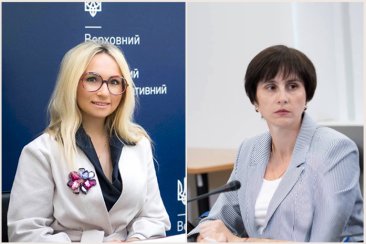Contact center of the Ukrainian Judiciary 044 207-35-46

The Secretary of the First Judicial Chamber of the Criminal Cassation Court within the Supreme Court Nataliia Antoniuk and the judge of the Administrative Cassation Court within the Supreme Court Nataliia Blazhivska joined the work of the round table "The Barnahus model in the framework of administrative procedures, pre-trial investigation and administration of justice / Theoretical and practical aspects", dedicated to the introduction at the legislative level of a special legal model for the protection of a child who has become an object / witness of criminal abuse or other unlawful acts.
Nataliia Blazhivska said that the Barnahus model had first been created in Iceland about 20 years before. The model quickly spread across Europe and is now being piloted and implemented in over 20 countries. It is considered to be evolving and can be adapted to different legal, socio-economic and cultural contexts.
The Barnahus model provides for multidisciplinary and interagency services organised "under one roof" in a child-friendly environment where the best interests of the child are a primary consideration. Each child is offered a multidisciplinary, professional and child-friendly service. According to this model, it is necessary to provide information, support and assistance in accordance with the role of the victim; conduct an individual assessment of the specific circumstances of each individual child victim to ensure that the needs and rights of children are identified and to ensure that special arrangements are taken to this end. The number of medical examinations should be minimized.
The judge said that currently, when Ukraine was going through the most difficult days of the war, the topic of child protection was very important. When investigating war crimes, it is necessary to work carefully with witnesses, victims, so that in the future it will be possible to prove in court the crimes committed against our people by the aggressor. Therefore, it is necessary to remember the very idea of the Barnahus model, which provides for multidisciplinary and interagency services.
Nataliia Antoniuk noted that taking into account the statistics of war crimes committed against Ukrainian children, the issue of improving criminal procedures for interrogating children who have become victims or witnesses of crimes is, in general, extremely relevant. The judge emphasized that the number of interrogations clearly affected the psyche of the child and entailed re-victimization. According to the speaker, re-victimization and traumatization of a child is a very big problem, so every effort should be made to minimize the negative impact on children during criminal proceedings.
The speaker stated that the Criminal Procedural Code of Ukraine did not take into account the conduct of legal proceedings with children who are witnesses or victims of crimes, and the courts had to look for ways out of such difficult situations so as not to injure the child's psyche.
Nataliia Antoniuk drew attention to the case law of the Criminal Cassation Court within the Supreme Court on interrogations of children who had the status of a witness or a victim in criminal proceedings. Thus, in the judgment of November 23, 2021 in case No. 369/1044/19, the local court examined the video recording of the interrogation of a minor witness according to the rules of the “green room”, in which the child (this witness) spoke in detail about the circumstances of the crime committed. The study of the video evidence of the interrogation of a minor witness and the admission of such video evidence as evidence in court made it possible to avoid the need for repeated summons and interrogations of the child and his re-victimization, which meets international requirements for interviewing a child - a witness or victim of criminal abuse, namely, Art. 35 of the Council of Europe Convention on the Protection of Children against Sexual Exploitation and Sexual Abuse (Lanzarote Convention, 2007), which was ratified by the Verkhovna Rada of Ukraine on August 27, 2012 and entered into force on December 1, 2012, the requirements of the UN Convention on the Rights of the Child and the UN Guidelines on Justice in Matters Involving Child Victims and Witnesses of Crimes.
In another criminal proceeding, the Supreme Court concluded that the court of first instance had reasonably refused to interrogate a minor victim, pursuing a legitimate goal, namely the preservation of mental and psychological health (ruling of June 3, 2022 in case No. 200/12044/18). The panel of judges of the Supreme Court pointed out that even the method proposed by the defence to interrogate the child victim remotely would not minimize the risks of harm to the victim’s health indicated by the psychologist, since the child would somehow have to answer questions from adults (participants in the trial) related to sexual abuse committed against him, which, taking into account his age and psychological health, did not justify such proceedings involving him.
In order to prevent re-victimization, it is necessary to enshrine in the Criminal Procedural Code of Ukraine the possibility for the court to use testimony given at the pre-trial investigation by a child who is a victim or witness of crimes. At the same time, it is also necessary to provide that during the trial, the interrogation of the child should be carried out only in cases where, for example, certain questions remained unanswered during the pre-trial investigation, when the defence asks new questions, when the judge considers that such questions may influence the qualification of the actions of the accused, the proof of guilt, etc.
The event was organized by the Sixth Administrative Court of Appeal and the Association for Social Development Through Law with the support of the Ministry of Justice of Ukraine.